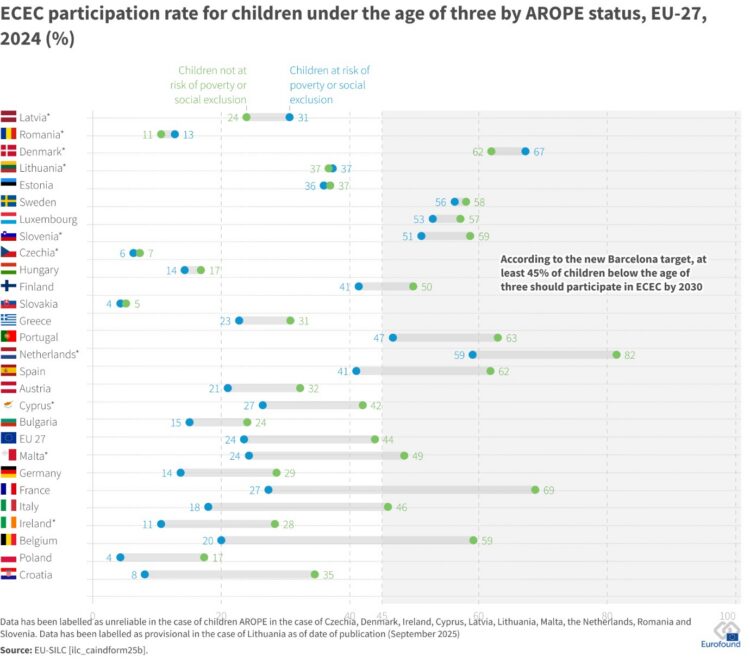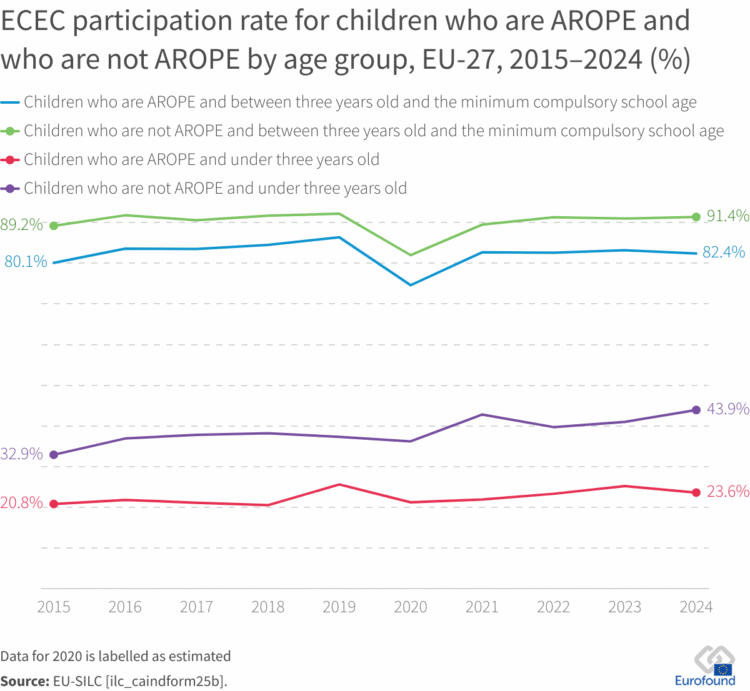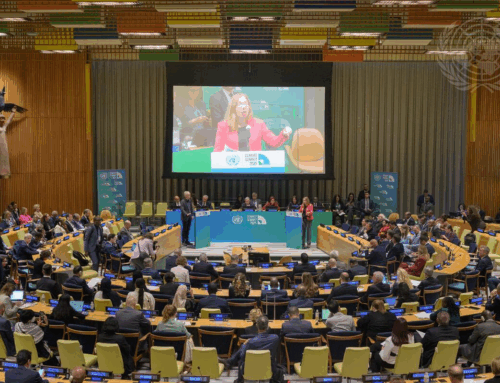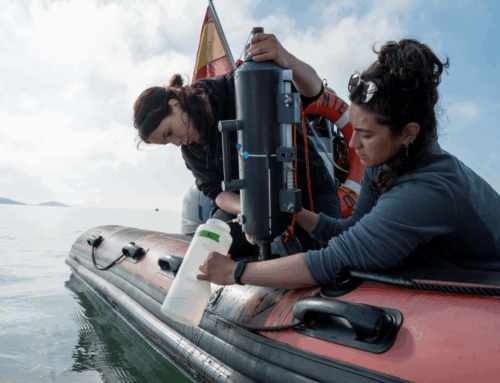Investing in Our Children’s Future Starts with Supporting the Workers Who Care for Them
September 29, 2025
In her State of the Union address in 2025, European Commission President von der Leyen recommitted to the EU ideal of equal opportunity by pledging to tackle poverty by 2050. This promise comes at a crucial time, as inequalities in access to early childhood education and care (ECEC) are increasing.
A closer look at the data reveals a stark reality: the children who stand to gain the most from these services are the very ones being left behind. This analysis—which uses data from Eurofound’s 2024 European Working Conditions Survey and EU SILC—examines the gap in ECEC participation and argues that the solution lies in a dedicated and well-supported workforce.
Minding the gap
Early childhood education and care is an important part of several major EU social policy frameworks: the European Pillar of Social Rights the European Child Guarantee the European Education Area; and the revised Barcelona Targets (as part of the EU Care Strategy). All these EU initiatives stress the importance of increasing the participation of children in ECEC.
However, only half as many young children at risk of poverty or social exclusion (AROPE) benefited from ECEC (23.6%) compared to children not at risk (43.9%) in 2024 (Figure 1). The gap in participation rates was more than double in the case of Germany, France, Italy, Ireland and Belgium. In Poland and Croatia participation rates for children who were at risk of poverty or social exclusion were more than four times lower than in the case of children under three who were not at risk.

Data has been labelled as unreliable in the case of children AROPE in the case of Czechia, Denmark, Ireland, Cyprus, Latvia, Lithuania, Malta, the Netherlands, Romania and Slovenia. Data has been labelled as provisional in the case of Lithuania as of data of publication (September 2025).
Source: EU-SILC (ilc_caindform25b)
Unfortunately, this gap has gotten wider over the last 10 years: from a 12.1 percentage point difference in 2015 to 20.3 percentage point gap in 2024 (Figure 2).

Change starts with the workforce
It is irrefutable that a well-qualified workforce is key to ensuring accessible, inclusive and high-quality services. However, the ECEC workforce is chronically undervalued.
The people who dedicate themselves to this line of work often demonstrate a strong sense of purpose, good work-life balance, and a commitment to training. Eurofound EWCS data highlights this.
Education workers score significantly higher than all other sectors of the labour market when it comes to the perceived usefulness of their own work (Figure 3).

Added to this, the work-life balance of education workers looks to be in better shape than that of the average across all sectors of the labour market: on average, 20 percentage points higher in 2021. The gap closed in 2024, mostly due to an increase in better work-life balance in all sectors compared to the two education sectors below (Figure 4).

To ensure that this seemingly motivated workforce stands ready to extend ECEC services to all, training is an essential aspect to consider. While only little more than half of pre-primary and primary educators reported receiving paid or on-the-job training in 2024 (Figures 5 and 6), these rates are higher than the average across the labour market. But is it enough to equip them with the tools to identify and support young children most at risk?


As well as perceived satisfaction with one’s job and a good work-life balance, the provision of training opportunities is a key determinant to decrease staff turnover, especially in hard-to-reach areas where the lack of personnel may lead to service closure.
Another major factor is, of course, pay. A recent report by Eurofound found that pay levels for ECEC workers in most countries were just above minimum wage level. Added to this, it found high rates of part-time work and temporary contracts—a combination that suggests ECEC workers are undervalued.
Higher wages and secure contracts increase retention, which is crucial for maintaining a stable and experienced workforce. By addressing the fundamental issues of pay and working conditions, policymakers can empower ECEC professionals to deliver the high-quality services needed to close the participation gap and give every child a fair start.
Moving forward
As the data shows, participation rates have increased over time, but inequalities have gotten worse over the last 10 years. This growing gap in participation rates between children from disadvantaged backgrounds and their more affluent peers demands a more targeted approach.
While EU-level ECEC policy frameworks are sound, it is important to pay more attention to funding workforce measures that go beyond the basics and instead focus on investing in the very people who shape a child’s early development.
We can see from the data that the professionals who dedicate themselves to early childhood education and care have a strong sense of purpose, a largely healthy work-life balance, and a commitment to ongoing training. Yet, they are fundamentally undervalued, with pay levels that barely exceed the minimum wage, and too often working on precarious contracts. This disparity is a key weakness in the ECEC system.
To make the EU’s commitment to tackling poverty effective, there must also be a commitment to the ECEC workforce. The upcoming reviews of the European Pillar of Social Rights and the revised Barcelona targets provide a critical opportunity to act. Policymakers should integrate indicators on the use of these services by various groups of children into the Social Scoreboard.
The European Social Fund Plus has been vital in supporting the ECEC workforce. Looking ahead, it’s essential that the next Multiannual Financial Framework (2028-2034) provides sufficient funding to ensure investments not only in infrastructure, but also in the people who deliver these services.
Ultimately, by valuing those who care for our children, we can build a fairer future for everyone.
Search
RECENT PRESS RELEASES
Related Post






